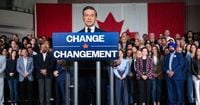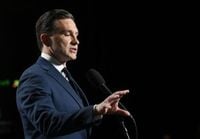As the federal election campaign in Canada reaches its climax, Conservative Party Leader Pierre Poilievre has unveiled a costed platform that promises significant cuts to government spending and a restructuring of the public service. Announced on April 22, 2025, in Vaughan, Ontario, the platform outlines a vision for the country that includes reducing the deficit by 70% and cutting reliance on external consultants.
Poilievre’s plan aims to cut $10.5 billion in spending on outside consultants while shrinking the government workforce through attrition, proposing to replace only two out of three departing employees. This approach could potentially reduce the size of the public service by approximately 17,000 positions annually. The public service has grown significantly in recent years, swelling to 367,772 workers in 2024 from 257,034 in 2015, according to the Treasury Board.
“Your tax dollars are precious, but under this bloated Liberal government, inflationary spending keeps going up while services keep getting worse,” Poilievre stated, emphasizing the need to trim excess from government operations without sacrificing frontline services. He also announced plans to eliminate university degree requirements for most government jobs, promoting a focus on skills over credentials.
The Conservative platform also promises to cut the annual federal deficit to $14.1 billion by 2028-2029 through a combination of reduced program spending and increased revenue. This includes plans to cut nearly $9.8 billion in spending while projecting an increase in revenue of around $5.2 billion by the same year. Additionally, the platform outlines a commitment to build 2.3 million homes over the next five years, addressing the ongoing housing crisis in Canada.
In stark contrast, Liberal Leader Mark Carney has also released his party’s platform, which aims to cap the public service size without providing specific details. Carney has promised a spending review to significantly reduce reliance on external consultants while improving the capacity of the public service to hire expertise in-house. He criticized Poilievre's proposals, describing them as lacking a serious plan to address the current economic challenges facing Canadians.
“These numbers are a joke. We aren’t in a joke. We are in the worst crisis of our lives,” Carney remarked during a campaign stop in Quebec City, emphasizing the need for a serious government plan.
Meanwhile, NDP Leader Jagmeet Singh has voiced strong opposition to the Conservative platform, arguing that cutting the public service during a time of crisis is misguided. “We’re going to need more public workers, we’re not going to need less of them,” Singh asserted, highlighting the necessity for more resources in public services rather than fewer.
As the election approaches, the political landscape is heating up, with record turnout reported during advance polling. Elections Canada indicated that over 7.3 million Canadians participated in the four-day advance voting period from April 18-21, 2025, marking a 25% increase from the last federal election.
Poilievre’s platform also includes a commitment to tax cuts, projecting an estimated $75 billion in tax reductions alongside $35 billion in new measures over the next four years. He claims these initiatives will save Canadians more than $56 billion between 2025 and 2029. The Conservative leader has pledged to cut the lowest personal income tax rate from 15% to 12.75%, offering an average savings of $900 for Canadian workers earning $57,000 annually.
Additionally, Poilievre announced plans to allow Canadians to contribute an extra $5,000 annually to Tax-Free Savings Accounts if they invest in Canadian companies. He also aims to enhance military spending, projecting an additional $17 billion for defence over the next four years, which would elevate Canada’s defence spending to meet NATO targets.
In response to the Conservative platform, Bloc Québécois Leader Yves-François Blanchet has criticized Poilievre’s promise of referendums on new federal taxes, labeling it as “hocus pocus.” He suggested that while the idea of making referendums more common is appealing, the specifics of Poilievre’s proposals lack substance.
As the election date approaches, party leaders are making their final pitches to Canadians. Poilievre’s campaign focuses on economic growth through tax cuts and deregulation, particularly in the energy sector, while Carney emphasizes a more cautious approach to spending and economic management. Singh continues to advocate for expanded public services and social programs, arguing that the Conservative plan would undermine essential supports for Canadians.
With the election just days away, Canadians are faced with critical choices regarding the future direction of their country. The contrasting platforms highlight differing visions for economic management, public service, and social support, setting the stage for a pivotal electoral decision.









